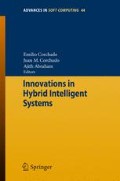Abstract
This paper introduces a class of neuron models accepting heterogeneous inputs and weights. The neuron model computes a user-defined similarity function between inputs and weights. The specific similarity function used is defined by composition of a Gower-based similarity with a sigmoid function. The resulting neuron model then accepts mixtures of continuous (crisp or fuzzy) numbers, and discrete (either ordinal, integer or nominal) quantities, with explicit provision also for missing information. An artificial neural network using these neuron models is trained using a breeder genetic algorithm until convergence. A number of experiments are carried out to illustrate the validity of the approach, using several benchmarking problems. The network is compared to a standard RBF network and shown to learn from non-trivial data sets with superior generalization ability in most cases. A further advantage of the approach is the interpretability of the learned weights.
Access this chapter
Tax calculation will be finalised at checkout
Purchases are for personal use only
Preview
Unable to display preview. Download preview PDF.
References
C. Bishop. Neural Networks for Pattern Recognition. Oxford, (1995).
P.M. Murphy, D. Aha. UCI Repository of machine learning databases. UCI Dept. of Information and Computer Science, (1991).
L. Prechelt. Proben1 — A set of Neural Network Benchmark Problems and Benchmarking Rules. Fac. für Informatik. Univ. Karlsruhe T.R. 21/94 (1994).
V. Tresp, S. Ahmad, R. Neuneier. Training Neural Networks with Deficient Data. In NIPS 6, Morgan Kaufmann, (1994).
J.L. Chandon, S. Pinson. Analyse Typologique. Masson, (1981).
J.C. Gower. A General Coefficient of Similarity and some of its Properties. Biometrics, 27: 857–871, (1971).
H. Mühlenbein, D. Schlierkamp-Voosen. Predictive Models for the Breeder Genetic Algorithm. Evolutionary Computation, 1(1) (1993).
Ll. Belanche, Ll. Evolutionary Optimization of Heterogeneous Problems. In LNCS 2439, pp. 475–484 (2002).
D. Lin. An Information-Theoretic Definition of Similarity. Proceedings of International Conference on Machine Learning (1998).
L. Zadeh. Fuzzy Sets as a basis for a theory of possibility. Fuzzy Sets and Systems, 1: 3–28, (1978).
Author information
Authors and Affiliations
Editor information
Editors and Affiliations
Rights and permissions
Copyright information
© 2007 Springer-Verlag Berlin Heidelberg
About this chapter
Cite this chapter
Belanche Muñoz, L.A. (2007). Modeling Heterogeneous Data Sets with Neural Networks. In: Corchado, E., Corchado, J.M., Abraham, A. (eds) Innovations in Hybrid Intelligent Systems. Advances in Soft Computing, vol 44. Springer, Berlin, Heidelberg. https://doi.org/10.1007/978-3-540-74972-1_14
Download citation
DOI: https://doi.org/10.1007/978-3-540-74972-1_14
Publisher Name: Springer, Berlin, Heidelberg
Print ISBN: 978-3-540-74971-4
Online ISBN: 978-3-540-74972-1
eBook Packages: EngineeringEngineering (R0)

